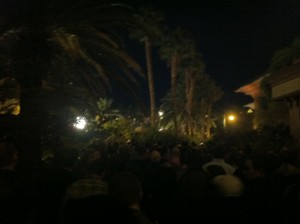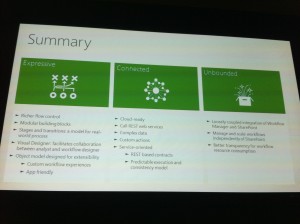 Man, where do I begin? So much information. Basically all of the messages were their own keynote addresses, with tons of great information. I’ll just try to briefly go through each speaker, chronologically, and then give what I gleaned from each speaker. I was not “able nor willing” (yes, that’s a pun; will make sense in the next paragraph) to blog as frequently as I initially desired, 1) because there was no internet at the convention center, and 2) because I really wanted to spend my time absorbing all that was said. Tim Challies live-blogged the event, so if you want to get a different perspective from mine on this, check it out @ www.challies.com . Great stuff.
Man, where do I begin? So much information. Basically all of the messages were their own keynote addresses, with tons of great information. I’ll just try to briefly go through each speaker, chronologically, and then give what I gleaned from each speaker. I was not “able nor willing” (yes, that’s a pun; will make sense in the next paragraph) to blog as frequently as I initially desired, 1) because there was no internet at the convention center, and 2) because I really wanted to spend my time absorbing all that was said. Tim Challies live-blogged the event, so if you want to get a different perspective from mine on this, check it out @ www.challies.com . Great stuff.
Woke up after getting a good nights’ sleep (definitely providential that God would get my mind ready for the onslaught of amazing sermons yesterday). The first guy to get up there was John MacArther. MacArther gave an excellent, Biblically-cited dissertation of the doctrine of Total Human Inability, that is that man, in himself, is incapable of doing anything good that is pleasing to God. Obviously, this is not to say that man does no good to his fellow man, but it is to say that even in those good works, if they are not done in faith, they do not only displease God, but they further incur wrath upon the sinner. The writer of Hebrews states that, “Without faith it is impossible to please Him.” (Hebrews 11:6) Paul states, “For the mind that is set on the flesh is hostile to God, for it does not submit to God’s law; indeed, it cannot. Those who are in the flesh cannot please God.” (Romans 8:7-8) This doctrine could not be clearer and those who would seek to snuff out this blatant language of Scripture oppose Christ Himself who makes utterly clear that, “No one can come to [Him] unless the Father who sent [Him] draws him (the person).” (John 6:44) Jesus also makes plain that, “… Apart from me you can do nothing.” (John 15:5) And finally, Paul’s crescendo of his statements in Romans 1-3 summed up in Romans 3:9-18. This could not be clearer.
MacArthur spoke on this topic in particular to show how if you try and water-down this point, this central, fundamental starting point of the message of the Gospel, the rest of it will make no sense. He stated that if you don’t preach or teach on the severity of this point, and if people will not accept and own this point themselves, all of the other points of the Gospel will neither make sense nor will they be able to understand why God had to go to such great lengths to bring us to Himself through the sacrifice of His own Son at Calvary. So in essence, if this point is either not emphasized at the beginning of presenting the Gospel to someone or if they totally reject it as nonsense, then you have nothing else to discuss with them. As I previously said about Ligon Duncan’s sermon, this to me was another “Amen!” sermon where we affirm and totally agree with everything he said pertaining to this doctrine. I think for a majority of people in the room, it was just great to hear a good, Biblical reiteration of this central truth of the Gospel for our own hearts, for both in our teaching and to personally apply to our own hearts in humility.
The next speaker was Mark Dever. Whereas MacArthur before him spoke of a solid truth that we know well in the Reformed tradition, at the very least as a stated doctrine (though by no means do we know it in our hearts as we should, don’t get me wrong), Dever spoke in such a way so as to provoke new thinking as it pertains to the Gospel itself and the resulting effects of it. More specifically though as the main point, he showed how we must be very careful not to confuse the two. Many nowadays, in attempting to make Christianity palatable to a culture that embraces uncertainty, would make the results of the Gospel the gospel itself and remove the offense of the cross in an attempt to win people for the Gospel. However, history shows this never works. “We preach Christ crucified, a stumbling block to Jews and folly to Gentiles, but to those who are called, both Jews and Greeks, Christ the power of God and the wisdom of God.” As Dever pointed out, this is a fatal error and is exactly what theological/religious liberal scholars and preachers did in the 19th and 20th centuries before us. I assume he was obviously speaking of emergents in particular. However, I can also clearly see this in the marketing movement within the church (who ironically the Emergents oppose with a vengeance), where the Rick Warren’s of the world seek to make their primary aim in preaching, teaching and ministry, the outworking effects of the Gospel as the gospel itself (though not stating it so overtly). And it is clearly made apparent simply by their way of doing preaching, teaching and ministry.
But, as stated so clearly in all of these sermons, our primary goal in the church itself (though not in anyway excluding our obligation to reach the world in local and global missions) is to faithfully proclaim the Gospel itself and let it function as the fundamental catalyst for producing all of the other effects of it. Does the latter take work and effort? Absolutely, and we should give it our all. But we should be doing it in order to bring a pure, clear Gospel message, not making it the outflow of the Gospel the end itself. Even philanthropic atheists make this their end with no reference to God at all. Our end as believers though is proclaiming and heralding the Gospel in all contexts for the glory of God. Our end is the glory and uplifting of the grace of Christ in His cross-work and doing exactly that through the faithful and clear proclamation of the Gospel. And I would say that if the church is floundering in its reach to a lost world, that it has lost the core message of the Gospel and thus the power of it to not just transform the culture around us, but mainly bring glory to God for the salvation of lost souls that He brings about, as He sees fit. So in summing up in one sentence, the main point that I found most interesting and thought-provoking was that we must dare not confuse the effects of the Gospel with the Gospel itself. This is vital for a healthy ministry.
After that was a panel discussion on what both MacArthur and Dever spoke about. The panel discussions are always awesome and really help clarify statements or bring certain aspects into greater focus. For the time being, I won’t go into those as awesome as they were.
After lunch, we started the afternoon session off with a masterful sermon by R.C. Sproul entitled the Curse Motif. This struck at how many times within a Gospel presentation in preaching, exhorting, teaching, whatever the situation, we ignore the Scriptural fact that Jesus became the curse Himself on the cross, taking on the full measure of the wrath of God in His body on the tree. The text he used to demonstrate this truth was Galatians 3:13 which says, “Christ redeemed us from the curse of the law by becoming a curse for us—for it is written, ‘Cursed is everyone who is hanged on a tree.'” He then took us on a Biblical journey through the Old Testament to show us how this unfolded throughout history, and starting with Moses he worked his way forward, bringing it to its climax in the person and work of Christ Himself. What really struck me was how he contrasted the blessings of God and the curse of God. To demonstrate the stark contrasts and level of intensity within each of these actions of God, Sproul used Numbers 6:24-26 which says, “The LORD bless you and keep you; the LORD make his face to shine upon you and be gracious to you; the LORD lift up his countenance upon you and give you peace.” I believe it was the first half of his sermon in essence that he honed in on this. There is no greater blessing that to be favorably looked upon by the very One who gave you life and breath to begin with. And then half-way through his sermon (maybe a little more than that) he turned his attention from the ultimate of blessings of God (namely the enjoyment and delight in God Himself) to show that the curse of God is the antithesis of Numbers 6:24-26. This could seem like, well yeah, that makes sense.
But to really grasp and feel the weight of the contrast between the two is to gain a greater grasp upon the very Gospel itself because in it we see Christ taking that curse in Himself and in fact becoming the curse for us. Sproul did a wonderful job of displaying this by taking the verses of numbers and reversing the meaning in curse-language, “May the Lord curse you, and abandon you; May the Lord keep you in darkness, and give you only judgment without grace; May the Lord turn His back upon you, and remove His peace from you forever.” Man. This is what awaits all those outside of Christ and what should be me. That is frightening. How frightening! But Sproul’s main point was not to discuss the judgment upon those who refuse the Gospel, but to emphasize that it was that very curse previously quoted that Christ willingly and voluntarily took in Himself upon the cross. Consider that the God of the universe, who united Himself to us, took in Himself this very curse. When you really ponder and meditate upon that reality, that the Son was cut from the Father in a way none of us can even begin to understand or peer into, it strikes you in the core of your being (at least it should in some manner if you confess Christ as your ransom) to what lengths He went to not only rescue His mercifully chosen people from damnation (i.e. the curse) but also to bring us to God that we may enjoy the opposite of the curse, namely, His blessings! OH the glories of the cross and the confirmation of what took place there in His resurrection! How wonderful a truth. This really fed my soul. There is nothing like Gospel-feasting, because in it we encounter Christ Himself, our supreme joy, the end for which He came!
The last message of day two was given by Al Mohler entitled, Why Do They Hate it So? The Doctrine of Penal Substitution. Mohler, as usual, going on about 24 tracks and wave-lengths at the same time in his thinking (something that was joked about throughout the conference), Mohler brought citation after citation of scholars, priests, clergy, and others within Protestantism (which entails both liberals and, unfortunately, now many evangelicals) who are either deliberately seeking to diminish or subtly lighten this doctrine because of its offense and (seeming) foolishness. Mohler made clear that he was not primarily speaking about the unregenerate who reject it, but those who claim the name Christian, as well those who claim the name evangelical. The one citation he gave that was really gut wrenching of someone doing this was a person (unknown at the moment) who stated that child abuse in the West is a direct result of the historic Christian doctrine of substitutionary atonement, because in it (according to this guy at least) God is portrayed as the one who takes delight in sadistically abusing His Son. Ugh. You could feel the whole room groaning inwardly after hearing their Savior’s work slammed by this guy in the quotation in such a specifically Satanic way. However, this doctrine must be contended for if the Gospel is to remain ablaze in the West. Otherwise, we risk the Gospel slipping back into the darkness, similar to that of the Dark Ages and Medevil times, prior to the Reformation (i.e. the recovery of the Gospel), the very thing we were there celebrating together. We must contend for and refuse to back down on substitutionary atonement though the world hates it so. It is at the heart of the Gospel message we proclaim. Diminish it, dampen it, water it down, take out the violent images of blood-sacrifice and dark, fearful wrath, and risk losing the only thing by which people may be saved: the very Gospel itself.















